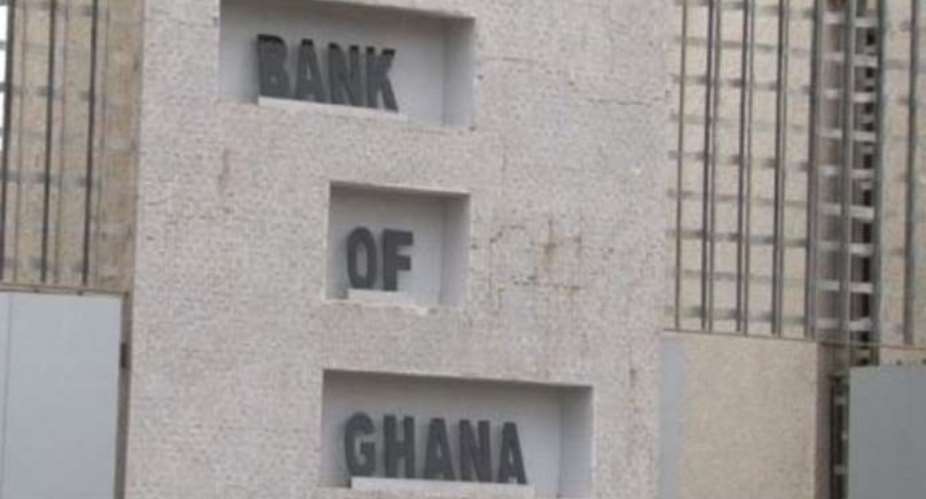Finally the Bank of Ghana (BOG) the apex bank has spoken. Five indigenous banks have been fused into the Consolidated Bank Ghana Limited.
It was obvious that these indigenous banks had turned the corner as they showed symptoms of stress in their operations.
Worries had been expressed about what could befall these banks especially following the apex bank's minimum capital deposit December deadline. By this directive, the apex bank had subtly pressed the alarm button about the unacceptable state of these banks.
As we waited for what the regulator was going to do in the likely event of the banks not able to meet the deadline, many opinions regarding the options at the disposal of the BOG were put forth. A catch 22 situation was obvious. Not responding to the situation was not going to be good for the banking sector and dealing with it head-on could encourage a panic outcome and erosion in confidence in the banking sector.
Applying the sledgehammer in a manner that could see the said banks compulsorily folding up without an acceptable exit strategy would have had disturbing consequences with far-reaching implications.
We recall President Akufo-Addo's call on the regulator to be mindful about the interests of indigenous banks as it considered the various options in the area of reforming the banking sector. It would appear that with the merger of the five banks, as it has turned out, the apex bank has not done badly especially as there is no likelihood of the merger causing an offloading of staff.
The merger as has taken place would obviate the chances of offering foreign banks the opportunity of a monopoly which without doubt would not have served our interest. With their home countries benefitting more from their operations overseas, such a monopoly of joint stock banking in Ghana could definitely not have been in our interest.
It is instructive to question how we came to this corner. It would inure to our interest if we probe what pushed the indigenous banks to the precipice. This way, a future recurrence would be obviated.
What happened to the outcome of a probe into the operations of these indigenous banks? Putting this on the public space would be in our interest as a country.
It would be worthwhile interrogating the manner in which licences were especially issued to these banks. Determining the level of political interference and the obvious relaxation of standards and how these offered the catalyst for the current situation is important in our study.
We are interested in the level of commitment of the apex bank in going to manage the aftermath of the timely intervention. A poor handling of the aftermath can obviously lead to erosion of confidence in the banking industry; the repercussions of which are all too clear in a country which is already under-banked. People keeping their monies outside the banks as a result of lost confidence should be parried by appropriate measures by the regulator such as regular supervision and monitoring.
The banking industry is a mirror of the economy and so any ailment, no matter the size, must be addressed adequately by the regulator by all means.
We hope that the timely intervention would serve the purpose for which it was applied.





 We’re disappointed over gov’t’s lacklustre attitude to negotiations of our condi...
We’re disappointed over gov’t’s lacklustre attitude to negotiations of our condi...
 No more Buffer Stock as Mahama promises to decentralise SHS food supply
No more Buffer Stock as Mahama promises to decentralise SHS food supply
 NSS urges President Akufo-Addo to sign National Service Bill into law
NSS urges President Akufo-Addo to sign National Service Bill into law
 You're lying, your 7-11pm dumsor attributed to overloaded transformers is false ...
You're lying, your 7-11pm dumsor attributed to overloaded transformers is false ...
 Consult Council of State on anti-gay bill – Mahama advises Akufo-Addo
Consult Council of State on anti-gay bill – Mahama advises Akufo-Addo
 Transport Ministry has no power to determine fares – COPEC
Transport Ministry has no power to determine fares – COPEC
 Brace yourselves for more economic hardship – Prof Adei to Ghanaians
Brace yourselves for more economic hardship – Prof Adei to Ghanaians
 Any government depending on IMF is likely to fail – Grand Coalition
Any government depending on IMF is likely to fail – Grand Coalition
 Ghana risks losing premium cocoa position due to galamsey – COCOBOD laments
Ghana risks losing premium cocoa position due to galamsey – COCOBOD laments
 Akufo-Addo launches NSS policy document to tackle under-utilisation of service p...
Akufo-Addo launches NSS policy document to tackle under-utilisation of service p...
